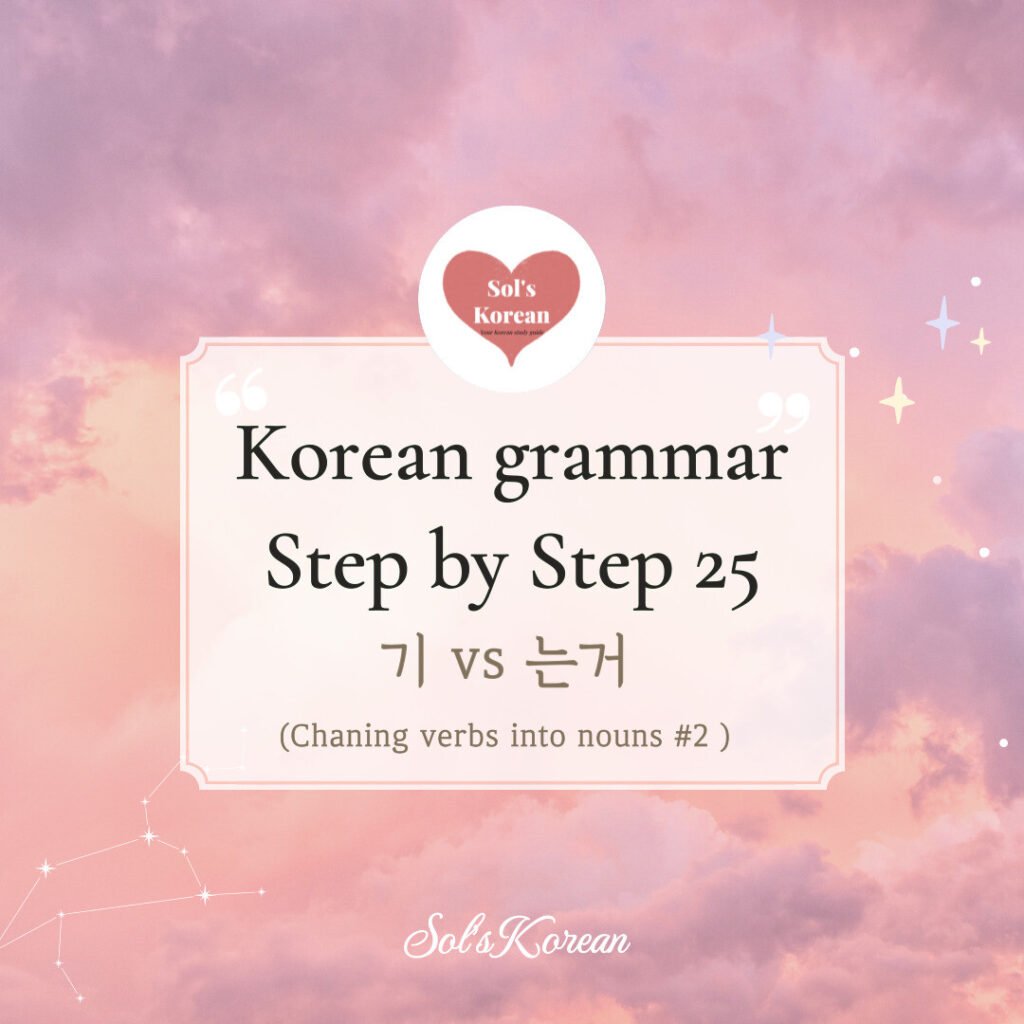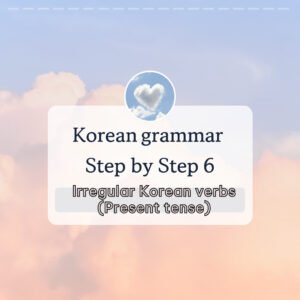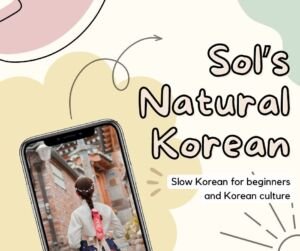기 vs 는 거, I’ll clear up your confusion right away!
Hello, everyone!
Today, I’m going to cover the grammar point ‘기,’ which can be confusing as it is similar to 는 거!
So, I will focus on the differences between 기 vs 는 거, as well as when to use 기 specifically.
I will explain each point step by step to facilitate understanding.
So just follow along with me!
Part 1,
Let’s grasp the concept of grammar
기 : transforming verbs into noun
How to Form “기”
To form 기, you simply attach 기 to the verb stem. Here’s how:
Simply drop the “다” part from the original verb, and add 기
■ 가다 (to go) → 가기 (going)
■ 먹다 (to eat) → 먹기 (eating)
■ 쉬다 (to rest) → 쉬기 (resting)
■ 찾다 (to find) → 찾기 (finding)
We’ve studied the 는 거 grammar, which is used to turn verbs into nouns. ‘기‘ works similarly but is used in more specific cases. ‘기‘ is mainly used when the main verb is an adjective or with certain verbs.
And ‘기’ is not as commonly used as 는 거.
To make things more simple, we’ll memorize the key adjectives and verbs where ‘기’ is preferred.
In most cases, you can stick with using ‘는 거.’
1. 기 싫다 : don’t want to do sth
When 싫어요 is used with 기, it means “don’t want to do sth,” usually at that moment.
(1)
밥 먹기 싫어요: I don’t want to eat
밥 먹는 거 싫어요: I don’t like eating(in general or usually)
(2)
지금 자기 싫어요 : I don’t want to sleep now
자는 거 싫어요 : I don’t like sleeping (in general)
(3)
숙제 하기 싫어! : I don’t want to do homework
숙제 하는 거 싫어 : I don’t like doing homework(in general)
What about using “-고 싶어요” to express “want to”?
기 싫어요 is more commonly and casually used compared to 고 싶어요. While both can be used to express “not wanting to do something,” 기 싫어요 is what you’ll hear more often in everyday conversations for a more relaxed tone.
밥 안 먹고 싶어요 : I don’t want to eat (Can sound a bit formal!)
밥 먹기 싫어요 : I don’t want to eat (Very casual!)
2. 기 귀찮다 : to be too lazy to do something
(1)
청소하기 귀찮아
I’m too lazy to clean/ I don’t feel like cleaning
(2)
진짜 가기 귀찮아
I’m really too lazy to go / I really don’t feel like going!
(3)
밥 하기 귀찮아
I’m too lazy to cook(make meal) / I don’t feel like cooking
(4)
오늘 하기 귀찮은데, 내일 할게.
I’m too lazy to do it today, I’ll do it tomorrow.
(5)
한국어 공부하기 안 귀찮아!
I’m not lazy when it comes to studying Korean! / Studying Korean isn’t a hassle!
3. 기 시작하다 : to start to do something
가다 = to go / 가기 시작하다 : start to go
먹다 = to eat / 먹기 시작하다 : start to eat
공부하다 = to study / 공부하기 시작하다 : start to study
(1) 다시 한국어 공부하기 시작했어
I started studying Korean again.
(2) 건강하게 먹기 시작했어.
I started eating healthy.
(3) 오늘부터 일본어 수업 듣기 시작 할거야!
I’m going to start taking Japanese lessons from today!
(4) 지난주부터 태권도 배우기 시작했어
I started learning Taekwondo last week.
(5) 나 어제부터 운전 연습하기 시작했어
I started practicing driving yesterday.
4. 기(를) 바라다 : to hope, to wish
낫다 = to be better / 낫기(를) 바라요 : I hope you get better
보다 = to see / 보기(를) 바라요 : I hope to see you
기를 often gets shorten to 길
(1) 잘 되길 바라요.
I hope it goes well.
(2) 항상 건강하길 바라.
I hope you stay healthy.
(3) 좋은 결과가 있기를 바라요.
I hope there will be a good result.
(4) 시험 통과하길 바라.
I hope you pass the exam.
(5) 여행 잘 다녀오길 바라요.
I hope you have a good trip.
-> But this one is not very commonly used; it sounds quite too formal!
Casually, I prefer to use (으)면 좋겠다 to express my wishes or hopes.
잘 됐으면 좋겠다! I hope it turns out well!
건강했으면 좋겠어요. I hope you stay healthy.
시험에 붙으면 좋겠다. I hope I can pass the exam.
살 빠지면 좋겠다. I hope I can lose weight.
예뻐지면 좋겠다. I wish I could become pretty
😊
(We don’t really separate ‘wish’ and ‘hope’ in Korean; we use the same grammar point to express both!)
5. – 기: Making lists
When making a list of things you are going to do, it’s also common to end the phrases with 기.
✨ My to-do list(오늘 할 일)✨
1) Take a Korean class : 한국어 수업 듣기
2) Clean the house : 집 청소하기
3) Do Korean homework : 한국어 숙제하기
4) Walk at least 30 minutes : 최소한 30분 걷기
5) Be happy : 행복하기
6. 기(에) 좋다 : good for [doing something]
(1)
This place is good for eating : 이 곳 밥 먹기(에) 좋아요.
“To express ‘eating,’ you can use either 는 거 or 기, but to indicate ‘good for doing something,’ you should only use 기.
Using 는 거 changes the meaning, as shown below:
밥 먹는 거 좋아요 : I like eating, It’s good to eat or Eating is good.
기(에) is specifically used for ‘good for doing something.’ You will often hear ‘기에’ with the particle ‘에‘ to mean ‘for’ in English, but using ‘에’ is optional. You can use it with or without ‘에,’ and both forms are commonly used.
(2)
This gym is good for exercising: 이 헬스장 운동하기(에) 좋아요.
The phrase ‘기에 좋다’ carries the nuance that this gym is convenient for working out or is a great place to work out.
Using 는 거 changes the meaning.
운동하는 게 좋아요: It’s good to exercise, Exercising is good or I like to exercise.
(3)
여기 주차하기(에) 좋아요 : This place is good for parking
주차하는 거 좋아요 : I like parking.
(4)
지금 날씨가 등산하기 좋아요: The weather is nice/good for hiking right now
등산하는 거 좋아요: I like hiking. Hiking is good. It’s good to hike.
(5)
지금 수영가기 딱 좋다 : It’s perfect for swimming right now.
수영하는 거 좋아요 : I like swimming, Swimming is good. It’s good to swim.
-기(에), it’s more specifically used to talk about places or conditions being convenient or good for doing something.
7. 기 편하다 & 편리하다 : comfortable & convenient for/to.
기 불편하다 : uncomfortable & inconvenient for/to.
This room is comfortable for studying.
이 방은 공부하기 편해요.
These shoes are comfortable to wear.
이 신발은 신고 다니기 편해요.
This bag is convenient/easy to carry around.
이 가방은 들고 다니기 편해요.
This app is convenient/easy to use.
이 앱은 사용하기 편해요.
To express ‘easy to do something,’ you can remember it as using 기 편하다.
It’s convenient to do grocery shopping because there’s a mart near my house.
집 근처에 마트가 있어서 장 보기 편리해요.
This chair is uncomfortable for sitting for a long time.
이 의자는 오래 앉아 있기 불편해요.
These shoes are uncomfortable to walk in.
이 신발은 걷기 불편해요.
8. 쉽다, 어렵다, 힘들다
Recommend using “기” most of the time✨
For adjectives like 쉽다 (easy), 어렵다 (difficult), or 힘들다 (hard/difficult), etc. You can use both 기 and 는 거.
I think 기 is slightly more commonly used than 는 거, though both are correct.
Let’s take a look at this
1. It’s difficult to study Korean.
한국어 공부하는 거 어려워요/힘들어요 (O)
한국어 공부하기 어려워요/힘들어요 (O)
Both sentences sound natural and are almost identical!
But sometimes using 기 emphasizes the action as it happens in the present moment (though honestly, there’s not a big difference!)
If I add the word 지금 (now), it’s better to use 기:
지금 공부하기 어려워/힘들어 -> sounds slightly better, as it conveys the current moment.
지금 공부하는 거 어려워/힘들어 -> this can be used as well, but using 기 sounds better.
2. It’s easy to swim here:
여기 수영하는 거 쉬워요. (O) -> While it’s not incorrect to say it, it’s better to use ‘기’ in this case
여기 수영하기 쉬워요. (O) → Here, now, it’s easy to swim in this place.
But it’s not always the case. If you look at the examples below, you can see that both are perfectly natural.
3. It’s hard to finish it now.
지금 끝내는 거 어려워요/힘들어요 (O)
지금 끝내기 어려워요/힘들어요 (O)
-> Both sound natural
4. Finding a house was easy.
집 찾는 거 쉬웠어 (O)
집 찾기 쉬웠어 (O)
-> Both sound natural
Overall, you can use either 는 거 or 기, but we use 기 slightly more often than 는 거.
(I asked all my Korean friends, and they told me they mostly use 기 over 는 거!)
And with some verbs(believe, forgive..), we use 기 over 는 거.
믿기 어렵다 – It’s hard to believe. (We don’t use 는 거, memorize it as it is)
용서하기 힘들 것 같아요 – I think it will be hard to forgive. (는 거 X)
Additionally, 기 쉽다/어렵다(힘들다) has a different meaning!
기 쉽다/어렵다(힘들다) can also mean “easy/hard to become or stay” something, usually related to feelings and emotions.
게을러지기 쉬워요 – It’s easy to become lazy. (In this case, we don’t use 는 거.)
긍정적이기 어려워요/힘들어요 – It’s hard to become or stay positive.
짜증나기 쉬워요 – It’s easy to get frustrated.
불안해지기 쉬워요 – It’s easy to get anxious.
차분하기 힘들어요 – It’s hard to stay calm.
As you can see, both ‘기’ and ‘는 거’ can be used with 쉽다, 어렵다, and 힘들다.
However, since ‘기‘ is used more often in certain situations (when the meaning is to stay, become something, or indicate the present moment),
so if you’re confused, you can remember to always use ‘기’ with 쉽다, 어렵다, and 힘들다.
We’ve covered the commonly used adjectives and verbs with 기, so you can memorize those.
Besides those specific ones, we use 는 거 much more often in daily speech!
I’ve written down some examples for clarity.
(1) It’s exciting to travel.
여행가기 신난다. (X) -> Sounds awkward.
여행가는 거 신난다. (O)
(2) I’m excited to go to the concert.
콘서트 가기 기대돼. (X) -> Sounds awkward.
콘서트 가는 거 기대돼. (O)
(3). It’s correct to do this way.
이렇게 하기 맞아요. (X) -> Sounds wrong
이렇게 하는 거 맞아요. (O)
(4). I’m happy to be with my friends.
친구들이랑 있기 행복해. (X) -> Sounds wrong
친구들이랑 있는 거 행복해.(O)
(5). It’s rude not to say hi
인사 안 하기 무례해요. (X) -> Sounds wrong
인사 안 하는 거 무례해요.(O)
(6). I’m worried about taking the exam.
시험 보기 걱정돼. (X) -> Sounds wrong
시험 보는 거 걱정돼. (O)
😊
Here are some additional examples with ‘기.’ I wasn’t sure whether to categorize them as part of ‘기’ grammar, but for those who want to study further, you can check these examples as well 🙂
9. -기로 했어요 : decided to do sth (only past tense!)
(1) I decided to study Japanese, instead of Korean.
한국어 대신, 일본어 공부하기로 했어요.
(2) I decided not to like you anymore.
더 이상 너를 안 좋아하기로 했어.
(3) I just decided not to care. (신경쓰다 : to care)
그냥 신경 안 쓰기로 했어
(4) A: Where are you planning to travel next year?
내년에 어디로 여행 하려고 해?
B: Oh, we decided to go to Greece.
우리 그리스에 가기로 했어.
(5) A: What did you decide to do this weekend?
이번 주말에 뭐 하기로 했어?
B: I decided to do nothing.
아무것도 안 하기로 했어
(6) I decided not to buy that skirt since I don’t have the money.
돈이 없어서 그 치마 안 사기로 했어
(7) We decided not to go to Jeju Island on this trip.
이번 여행에서 제주도는 안 가기로 했어.
These are conjunctions(connectors) that contain ‘기.’
I will cover these separately with advanced grammar or in an additional post.
It might be overwhelming to memorize all of this at once, so try to get familiar with the ones above.
That’s already almost 10, which is more than enough!!
10. -기 전에 : before + verb
11. -기(는) 하지만, 한데, 해도 : even though, despite
12. -기 위해(서) : in order to (You can check this in my Step #22 post.)
13. -기 때문에 : because
etc…
Okay, we’ve come a long way! Now it’s time to put what we’ve learned into practice.
There’s no point in learning grammar if you don’t know how and when to use it properly.
I’ve prepared some examples, so now it’s your turn to create sentences using 기 or 는 거 on your own.
😉
Part 2,
Practice making sentences #1
1. Sometimes it’s hard to understand Koreans because they(Koreans) talk fast.
(sometimes: 가끔 / understand: 이해하다 / talk fast: 말(을) 빨리 하다)
2. I was too lazy to do my homework today, so I didn’t do it. (casually!)
(homework: 숙제)
3. My tasks for today are: “1. Doing laundry 2. Grocery shopping 3. Watching a Korean drama.”
(tasks for today(to-do list): 오늘 할일 / do laundry: 빨래하다 / grocery shopping: 장보다)
4. It’s easy to become lazy if you just(only) stay at home.
(become lazy: 게을러지다 / stay: 있다(to be) / if: (으)면)
5. I think these shoes will be uncomfortable to wear for a long time. (casually!)
(shoes: 신발 / wear: 신다 / for a long time: 오랫동안)
6. I don’t want to go out because I like lying in bed so much.
(go out: 나가다 / so much=(too): 너무 / to be lying: 누워있다)
7. I’m going to start exercising again next week! I’ll try to eat healthy.
(again: 다시 / next week: 다음주 / healthy: 건강하게)
8. This cafe has plenty of outlets, so It’s good for studying here on a computer.
(plenty of: 많이 / outlets: 콘센트)
9. This recipe is so easy to follow!
(recipe: 레시피 / follow: 따라하다 / so : 진짜)
10. It’s not good to talk behind other people’s backs a lot.
(other people: 다른 사람들/ talk behind someone’s back: 뒷담화하다)
11. It’s disrespectful to speak casually to elders in Korea.
(disrespectful: 예의가 없다/ speak casually: 반말(을) 하다 / elder: 어르신 / to: 께(formal))
12. Sometimes it’s hard to remember the Korean grammar rules.
(remember: 기억하다 / grammar: 문법/ rule: 규칙)
13. The weather has been nice for a walk lately.
(weather: 날씨 / go for a walk: 산책하다 / lately: 요즘)
14. Sitting in front of the computer all day is really boring. (casually!)
(sit: 앉아 있다/ in front of : 앞에 / all day: 하루종일 / boring: 지루하다)
15. Are you still sick? I hope you get better soon.
(still : 아직/ sick: 아프다 / get better: 낫다 / soon: 얼른)
Thy these on your own first, before checking the answers!
These are the answers:
1. Sometimes it’s hard to understand Koreans because they(Koreans) talk fast.
(sometimes: 가끔 / understand: 이해하다 / talk fast: 말(을) 빨리 하다)
한국 사람들은 말(을) 빨리 해서, 가끔 이해하기 어려워요.
* It’s hard to understand—since the verb is 어렵다/힘들다, it’s safer to use 기: 기 어려워요.
* The reasoning comes first! The ‘because’ part should come first. We will use 아/어/해서 grammar!
2. I was too lazy to do my homework today, so I didn’t do it. (casually!)
(homework: 숙제)
오늘 숙제하기 귀찮아서, 안 했어.
* too lazy to do homework—here, we will use 기 귀찮다 : 숙제하기 귀찮아.
* We will combine it with the 아/어/해서 grammar to express ‘so.’
3. My tasks for today are: “1. Doing laundry 2. Grocery shopping 3. Watching a Korean drama.”
(tasks for today(to-do list): 오늘 할일 / do laundry: 빨래하다 / grocery shopping: 장보다)
오늘 할일: 1. 빨래하기 2. 장보기 3. 한국 드라마 보기.
* When making a list, we use the 기 ending! Simply drop the 다 and add 기 to the verb stems.
4. It’s easy to become lazy if you just(only) stay at home.
(become lazy: 게을러지다 / stay: 있다(to be) / if: (으)면)
집에만 있으면 게을러지기 쉬워요.
* easy to become lazy—here, we will use 기 쉽다 : 게을러지기 쉬워요.
* to express “just, only” we can add “만” after at home!
* We haven’t studied ‘if’ yet, but I will cover it very soon. You can use 면 when the verb ends in a vowel, and 으면 when the verb ends with a batchim!
If you study Japanese—일본어 공부하면
If you eat too much—너무 많이 먹으면
5.I think these shoes will be uncomfortable to wear for a long time. (casually!)
(shoes: 신발 / wear: 신다 / for a long time: 오랫동안)
이 신발(은) 오랫동안 신기(에) 불편할 것 같아.
* be uncomfortable to do sth—here, we will use 기 불편하다 : 신기 불편해요.
* We will combine this with the ‘I think’ (-것 같아요) grammar. Since it’s in the future tense, we will add ㄹ and 것 같아요. If you’re not sure how to use this yet, please check this post!
6. I don’t want to go out because I like lying in bed so much.
(go out: 나가다 / so much=(too): 너무 / to be lying: 누워 있다)
침대에 누워 있는 게 너무 좋아서 나가기 싫어요.
* don’t want to do sth—here, we will use 기 싫다 : 나가기 싫어요.
* You can use 나가기 귀찮아요 as well; they function very similarly! Both expressions sound natural and convey the same meaning.
* You can also say 나가고 싶지 않아요; it just sounds a bit more formal!
* The reasoning comes first! The ‘because’ part should be placed at the beginning. We will use the 아/어/해서 grammar!
* To be lying down is 누워 있다. You can memorize it as it is!
7. I’m going to start exercising again next week! I’ll try to eat healthy.
(again: 다시 / next week: 다음주 / healthy: 건강하게)
다음주부터 다시 운동하기 시작할 거예요. 건강하게 먹으려고 할 거예요.
* start exercising—here, we will use 기 시작하다 : 운동하기 시작하다.
* To express ‘try to,’ we can use (으)려고 하다. If you don’t remember this grammar, please check it out here!
8. This cafe has plenty of outlets, so It’s good for studying here on a computer.
(plenty of: 많이 / outlets: 콘센트)
이 카페(에)는 콘센트가 많아서, 컴퓨터로 일하기 좋아요.
* good for studying—here, we will use 기 좋아요 : 일하기 좋아요.
* Here, using 편해요 also sounds natural, just like 일하기 편해요, which means it’s convenient to study here using a computer!
* To say ‘on a computer,’ like ‘using a computer,’ we can use the (으)로 grammar. If you don’t remember this, take a moment to revisit and review!
9. This recipe is so easy to follow!
(recipe: 레시피 / follow: 따라하다 / so : 진짜)
이 레시피(는) 따라하기 진짜 쉬워요!
* easy to follow—here, we will use 기 쉬워요 : 따라하기 쉬워요.
10.It’s not good to talk behind other people’s backs a lot.
(other people: 다른 사람들/ talk behind someone’s back: 뒷담화하다)
다른 사람들 뒷담화 많이 하는 거 나빠요.
* Hehe, this one was a trick! 😁
For sentences like ‘it’s not good‘ or ‘talking behind someone’s back is not good,’ we’ll use 는 거 grammar. It’s not part of the 기 list. 🙂
* 하는 건, 하는 게 are also correct!
11. It’s disrespectful to speak casually to elders in Korea.
(disrespectful: 예의가 없다/ speak casually: 반말(을) 하다 / elder: 어르신 / to: 께(formal))
한국에서 어르신들께 반말(을) 하는 건 예의가 없어요.
* This one was a trick too! I hope you can see the differences between 기 and 는 거 and know when to use them accordingly with these practices. It’s not necessary to use 기 here since it’s not part of the list we covered today! 🙂
* 하는 거, 하는 게 are also correct!
* I added 들 to show plurality: elders (어르신들) vs. elder (어르신). But you can definitely use the singular form (어르신), since we often replace plural with singular in Korean.
12. Sometimes it’s hard to remember the Korean grammar rules.
(remember: 기억하다 / grammar: 문법/ rule: 규칙)
가끔 한국 문법 규칙(들을) 기억하기 어려워요
* hard to remember—here, we will use 기 어려워요 / 힘들어요 : 기억하기 어려워요. or 힘들어
13. The weather has been nice for a walk lately.
(weather: 날씨 / go for a walk: 산책하다 / lately: 요즘)
요즘 날씨가 산책하기 진짜 좋아요.
* nice/good/perfect for walking—here, we will use 기 좋아요 : 산책하기 좋아요.
14. Sitting in front of the computer all day is really boring. (casually!)
(sit: 앉아 있다/ in front of : 앞에 / all day: 하루종일 / boring: 지루하다)
하루종일 컴퓨터 앞에 앉아 있는 거 진짜 지루해
* Here, to express “sitting,” we will use 는 거 grammar 🙂
15. Are you still sick? I hope you get better soon.
(still : 아직/ sick: 아프다 / get better: 낫다 / soon: 얼른)
아직 아파요? 얼른 낫기를 바라요!
* I hope—here, we will use 기 바라요 : 낫기(를) 바라요.
* Casually, 얼른 나으면 좋겠어요 is also commonly used!
* 낫기를 is often shortened to 낫길 🙂
* To say Get better soon, we use 얼른 낫다 or 빨리 낫다. These two are the most commonly used expressions, so you can memorize them as they are!
Great job!
You’ve been doing an excellent job—keep up the good work!





